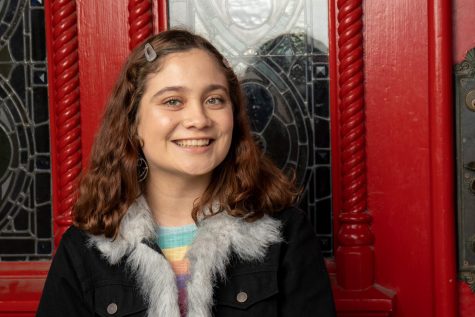APD unveils soft interview rooms to ensure trauma-informed approach
The interview rooms are located in APDs headquarters in downtown Austin. The rooms are now furnished with soft-seating instead of the previous hard seating.
Austin Police Department’s (APD) Sex Crimes and Domestic Violence units unveiled six new interview rooms on Nov. 4. The rooms were redesigned with survivors of sexual assault and domestic violence, along with their children, in mind, paying close attention to color and texture to make survivors feel safe.
The new rooms were designed by Project Beloved, a Fort Worth-based nonprofit. Project Beloved works to change the conversation surrounding sexual assault and empower survivors to embrace their voices through trauma-informed care (TIC).
TIC is different from the usual care given to survivors because it revolves around the body’s biological and neurological response to trauma. A soft interview room is considered a vital part of TIC. Soft interview rooms create the necessary space to help survivors feel comfortable, which can also have a positive effect on the interview process.
Project Beloved helped APD with the changes, which included buying new furniture with soft fabric, repainting the walls with neutral colors, installing white noise machines and providing blankets to survivors.
Project Beloved isn’t the first organization that aims to create an easier path towards survivors’ healing. SAFE Austin, founded in 2015, values include creating a just and safe community free of violence and abuse.
Chief Public Strategies Officer Piper Stege Nelson and Senior Director of Sexual Assault and Health Services Juliana Gonzales said they were excited to hear about APD’s new changes.
“Soft interview rooms ensure that survivors feel comfortable, Nelson and Gonzales said. “After experiencing a traumatic event, the body and the mind often are in shock and deserve the utmost respect, care and comfort. In addition, some survivors may have had negative experiences with institutions, including law enforcement. These soft interview rooms tell the survivor that this will be different, that they will be heeded and respected. Retelling the story of an assault can itself be re-traumatizing, which is why it’s important to make the environment as comfortable as possible for survivors.”
Survivors of sexual assault can often be retraumatized and suffer a lot of stress during the interview process with law enforcement. APD’s implementation of soft interview rooms hopes to remedy this issue.
“Austin has made enormous strides over the last few years – the creation of Eloise House, clearing the DNA backlog, trying more sexual assault cases,” Nelson and Gonzales said. “Having watched this closely for the past few years, we are seeing public systems that are trying to do the right thing for sexual assault survivors.”
The Austin community is said to benefit from these safe spaces, especially young students like those enrolled at St. Edward’s University. Dr. Delia Kothmann-Paskos, a psychology professor at SEU, commented on APD’s recent strides.
“APD has received a lot of bad publicity about how they handle these types of cases,” Paskos said. “Sexual assault cases are notoriously difficult to work and especially difficult to prosecute. That has more to do with limitations in the Texas law than efforts on the part of APD and prosecutors. I think the sex crimes unit is doing the best they can with the limited resources they have and the nature of the crimes they investigate. That being said, there is always room for improvement. Soft rooms are a step in the right direction, especially by focusing on the needs of/benefits to survivors.”
Project Beloved plans to work with other local, and eventually non-local agencies to install soft interview rooms in more police stations.

Hey ya'll! My name is Sammy Jo Cienfuegos and I'm one of the two Viewpoints editors. I'm a senior Writing and Rhetoric major, with an emphasis in Creative...







